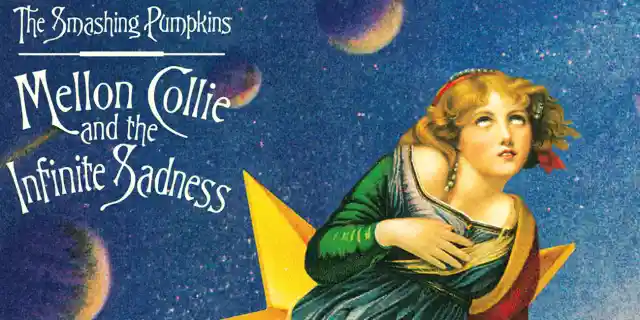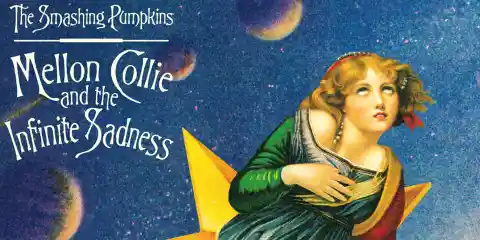

As much as we like to lay praise on artists, particularly musicians, for being humble, the reality is that if you’re putting your stuff out there for the world, at least, part of the reason is ego. Yet, there are certain artists, usually when they are working in areas that are more personal and maybe from an outsider perspective, that we just somehow assume are beyond any self-aggrandizement. We like to think that those songs about being lonely and depressed just accidentally got out to the public, maybe. It takes a lot of ego, maybe even to the point of hubris, to release a double album, and it doesn’t always pay off. Virtually every double album I can think of has been called bloated by at least half the critics. The Smashing Pumpkins’ Mellon Collie and the Infinite Sadness, which turns 20 this year, is no exception and it’s easy to see how that could mess with an artist’s head.
The Smashing Pumpkins to me have always been about geek rock. It’s the type of music you listen to alone in your room when you don’t know how to get out there and be cool. You might be wishing you had the courage to go out there, or you may have tried and failed, but either way, this music is your reminder that you are not alone. It speaks to your sadness, but there is still joy in it. It soothes your wounds and calms you, but also lets you rage and release. You can cry and rock out at the same time and while this is all true of their previous 2 albums, Gish and Siamese Dream, this album, in particular, takes that to the extreme, by letting the king geek’s ego run wild to glorious effect. Between the title, the artwork and the progression of songs, this album laid out, if not a road map, a sort of travelogue of what it’s like to be an outcast. With songs like “Jelly Belly,” “Tonight, Tonight” and “Bodies,” it was simultaneously documenting what was and calling on the freaks and geeks to come be a part of it.
I’ve always wondered just how much of the album’s lyrics were strictly from personal experience. “Zero” was the song that hooked me into, not just this album, but the Pumpkins in general. It was a very strange time for me in my 20s and lines like “I never let on that I was on a sinking ship/ I never let on that I was down” and “you blame yourself for what you can’t ignore/ you blame yourself for wanting more” summed it up perfectly. This guy had to know what I was feeling to write that. He must have felt it, too. And to put it in a song that inspires you to rock out demonstrates a clear understanding of what a lonely, depressed person with low self-esteem really needs, and it’s not more of pity or happy thoughts. But it’s also not wallowing. After that, it’s easy to sing along, behind tears, maybe, to “Here Is No Why.” Because only after acknowledging what it is you are feeling and understanding that it’s real and not a simple fix, can a line like “if you’re giving up, then you’re giving in” have any weight to it.
All of this is easy to forget if you focus on the popularity of the band at the time and the list of hit singles from this album. But it’s important to remember that this is mainly because, for whatever reason, the 90s is when being a geek was starting to become acceptable, trendy and even desirable. We were being specifically targeted by the market and commodified. It’s a conundrum I think outcasts from all corners are still not sure how to handle, and it’s affected everything from music to comic books and gaming culture and beyond. So when you hear Billy Corgan screaming about the world being a vampire in “Bullet with Butterfly Wings” in that context, you have to understand that this album was coming at a time where that vampire was draining something that it had created through rejection.
Sonically, the Smashing Pumpkins sound through this album was always very distinct. They always had a certain atmosphere to their songs. Where The Pixies and Nirvana were focused on the quiet/loud dynamic, I think the Pumpkins were working more with a dynamic of beauty and ugliness, smooth and rough, melody and distortion. But they were never afraid, even from the beginning, of having a well-produced, clean sounding record. A lot of bands mistake raw for authentic and in turn, sloppy for raw. But the Pumpkins were clearly influenced by The Beatles, as evident in the amount of attention to detail what they put into their albums. Just listen to this with headphones on and you’ll hear so much going on. And while credit must definitely go to Flood and Alan Moulder for co-producing the album with Corgan, it is well known that this was one of the last times the whole band had input into the creation of the record.
It’s impossible to talk about this album without discussing “1979.” It’s quite likely the first song everyone thinks of when they think of this band, and it’s in the pantheon of most iconic songs of the era. It was inescapable at a time when radio was still relevant and MTV still played music. I’ve easily heard the song thousands of times, no exaggeration. And yet, listening to this album again for this review, that song still gives me chills. The picture it paints, the moment it captures, and the emotions that come through are all just as vivid 20 years later. When that crystal clear drum breaks in at the beginning I get lost in it. By the time it builds to the chorus, I’m in awe of how perfect this is and how great this band could sound. I can see the “freaks and the ghouls” around me, some of us posing, trying to be cool, but Billy really does know us better than we fake it. And then, the beauty gives way to full-blown metal in “Tales of a Scorched Earth” where our faces all get melted off, because you can’t pigeon hole this thing. And speaking of metal, another standout track comes a few songs later in “X.Y.U.” which explodes with anger and ferocity as it goes along, taking us through fire and destruction, exposing serious pain the whole way. It’s ugly and somehow refreshing.
Billy Corgan didn’t invent any of this, of course. It’s territory that is familiar to fans of goth, metal, and even punk. Bands like The Smiths, New Order, Siouxsie and The Banshees all had embraced and been embraced by sad outsiders before. But when I hear “We Only Come Out At Night,” it’s clear this is different, particularly in the context of the album, where the reasons for us only coming out at night have been laid bare. This is who we are and rather than wallow in it, I think the album is about accepting it or moving on. Either use this as a way to move past these dark times of youth or accept that you are not a “normal” type of person, whatever that might mean. You are a geek. You are a goth. You are what you are. And that’s ok if you think it is, because you are not alone. This can be felt in the last few songs, “Beautiful,” “Lily (My One and Only)” and “By Starlight,” which are really just very beautiful, innocent, and almost childlike love songs. Rather than losing steam, the album has built to these moments of peace, love and understanding. Then we get the lullaby “Farewell and Goodnight” from the band, which frames the whole album as the message it is. This album is an embrace of reassurance from geek to geek in the least condescending way possible.
The thing about double albums is that they can be all over the place and be mostly filler. It happened to The Beatles. With Mellon Collie and the Infinite Sadness, though, any songs you might consider filler, are still maintaining an atmosphere that is consistent throughout, despite any variation in genre. I think that’s the biggest accomplishment. And while it is divided into a day half and night half and the themes are all meant to be cohesive, it is not a concept album at all. There’s not necessarily a story holding it together, but I’m sure most of us imposed our own tragic story on to its emotional frame. That’s brilliant. And now that it’s 20 years old, I wonder how the next generation will take this album in an era of singles.